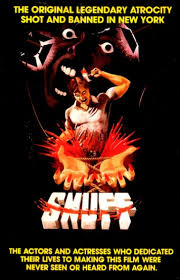A notorious “nasty” and among the silliest movies to ever earn such a level of controversy, this movie’s enduring legacy is that it brought wide attention to the concept of the “snuff” movie, even though anyone lured in by its notorious marketing campaign will inevitably be disappointed to find themselves watching a whole other movie (literally!) until the very end when some obviously fake gore footage shows up masquerading as “snuff”. It starts out as a post-Manson EASY RIDER rip-off, complete with a song that sounds so much like “Born To Be Wild” that Steppenwolf would have probably sued…if they could be arsed to watch the movie.
Heroine Mirtha Massa is an actress working for schlock filmmaker Aldo Mayo (who talks like Boris Karloff reading from an autocue) who travels to make a questionable movie in Chile (“It’s what the public want to see…” someone says dubiously, unintentionally predicting this film’s fate), where her misadventures intersect with that of a Manson-ish cult.Set to a relentless, doodling Sunday night jazz club soundtrack, SNUFF is a mish-mash of tan-lined nudity, unintentionally amusing child abuse flashbacks, foot torture and amateur performances – certainly nothing more outrageous than your typical 70’s 42nd Street exploitation flick. The climactic home invasion massacre tastelessly riffs on the fate of the pregnant Sharon Tate, though it’s the final five minutes that single-handedly drove the marketing campaign and earned the film notoriety. Anticipating the found footage sub-genre partly spawned from CANNIBAL HOLOCAUST, the film we are watching pulls back to reveal a camera crew filming the butchering of a young woman. It’s visceral and not nearly the worst of 70’s no-budget gore FX, but no sane person of any cinematic era would mistake it for the real thing, particularly with the goofy acting and the unconvincing last line, “Shit! We’ve ran out of film” as the screen goes black. SNUFF remains an entertaining curio, and worthy of several chuckles as you investigate what all the fuss was about.
Review by Steven West



